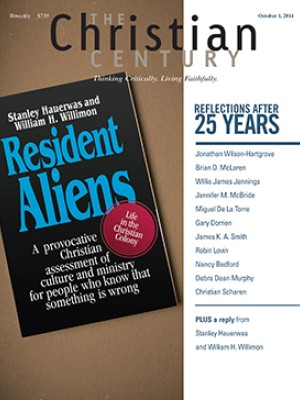Christian leaders differ on strikes in Iraq, Syria
While some prominent Christians have called on the United States to take more forceful military action against Islamic extremists in Iraq and Syria, more than 50 leaders of Catholic, Protestant, and other Christian groups wrote an open letter to President Obama asking him to halt U.S. air strikes and pursue solely peaceful means to resolve the conflict.
“While the dire plight of Iraqi civilians should compel the international community to respond in some way, U.S. military action is not the answer,” the 53 clergy, theologians, and religious sisters and brothers wrote in the open letter. “Lethal weapons and air strikes will not remove the threat to a just peace in Iraq. As difficult as it might be, in the face of this great challenge, we believe that the way to address the crisis is through long-term investments in supporting inclusive governance and diplomacy, nonviolent resistance, sustainable development, and community-level peace and reconciliation processes.”
Read our latest issue or browse back issues.
The signatories note that while Pope Francis recently said it was “licit to stop the unjust aggressor”—referring to the Islamic State, or IS—the pontiff underscored that he was not endorsing bombing or warfare.
“We understand and deeply share the desire to protect people, especially civilians,” the leaders wrote. “However, even when tactics of violent force yield a short-term displacement of the adversary’s violence, such violence toward armed actors is often self-perpetuating, as the retributive violence that flares up in response will only propitiate more armed intervention in a tit-for-tat escalation without addressing the root causes of the conflict. We see this over and over again.”
The signers are Susan T. Henry-Crowe, general secretary, General Board of Church and Society for the United Methodist Church; Gradye Parsons, stated clerk of the Presbyterian Church (U.S.A.) General Assembly; and Susan Brooks Thistlethwaite, professor of theology at Chicago Theological Seminary, in addition to other academics and other denominational leaders.
The signers argued that many factors contributed to the current volatile mix in the Middle East, including past U.S. political and military campaigns in the region. And they point to the U.S. strikes that helped oust Libyan dictator Muammar Qaddafi in 2011 as an example of how that approach has backfired in the past.
“More bombing will ultimately mean more division, bloodshed, recruitment for extremist organizations, and a continual cycle of violent intervention,” they wrote.
The letter writers list eight specific recommendations for their “just peace” agenda, including an arms embargo and financial sanctions on the armed groups.
The letter, dated August 27, stands in contrast to a petition launched earlier in August by more than 50 Christian and Jewish leaders as well as other academics who demanded that Obama sharply escalate military action against Islamic extremists in Iraq. They said that “nothing short of the destruction” of the Islamic State can protect Christians and other religious minorities.
“We further believe that the United States’ goal must be more comprehensive than simply clamping a short-term lid on the boiling violence that is threatening so many innocents,” they wrote.
They called for expanding air strikes as well as “for the United States to provide arms, ammunition, and equipment to Kurdish forces, Sunni tribesmen, and others” fighting against the IS.
Robert P. George, a prominent Catholic and Republican at Princeton University, organized the petition. Signatories include Cornel West, professor of philosophy and Christian practice at Union Theological Seminary in New York City; Russell Moore, president of the Ethics and Religious Liberty Commission of the Southern Baptist Convention; and Susannah Heschel, professor of Jewish Studies at Dartmouth College in Hanover, New Hampshire. —Religion News Service, added sources
This article was edited September 15, 2014.





